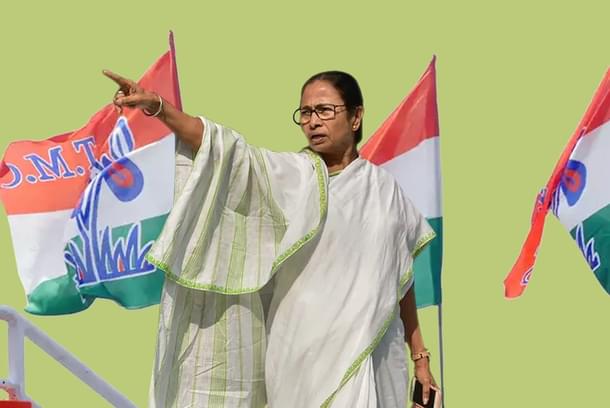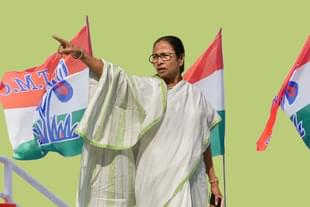Politics
Why Trinamool’s ‘Joy Bangla’ Slogan To Counter ‘Jai Shree Ram’ Has Kicked Up Controversy Again
Jaideep Mazumdar
Mar 17, 2020, 01:43 PM | Updated 01:43 PM IST
Save & read from anywhere!
Bookmark stories for easy access on any device or the Swarajya app.


The Trinamool’s bid to stoke Bengali sub-nationalism and ride on Bengali ‘pride’ to retain power in the state seems to have run into choppy waters.
After the BJP wrested 18 of the 44 Lok Sabha seats in the state last year, thereby dealing a blow to the Trinamool, West Bengal Chief Minister Mamata Banerjee hired political strategist Prashant Kishor to help her party.
Kishor suggested that the BJP be portrayed as a party of ‘outsiders’ and the Trinamool projects itself as a party that will protect the interests of Bengal. And thus, to counter the BJP’s ‘Jai Shree Ram’ slogan, the Trinamool decided on the ‘Joy Bangla’ cry.
But the problem, as many pointed out last year itself, was that ‘Joy Bangla’ was a slogan popularised by Bangladesh’s founder Sheikh Mujibur Rahman during the 1971 Liberation War.
It became the war cry of Bengali nationalists of that country that charged their struggle to overthrow the genocidal West Pakistani regime (read this).
Meghalaya governor Tathagata Roy, who headed the Bengal unit of the BJP earlier, slammed the Trinamool and called the raising of the ‘Joy Bangla’ slogan in Bengal seditious.
In a series of Facebook posts last year, Roy had pointed out that the slogan which the Trinamool was raising was “deliberately seditious, designed to promote insidious sub-nationalism”.
“‘Joy Poschim Bongo’ (slogan) will never be raised because those who are yelling ‘Joy Bangla’ want people to forget that Poschim Bongo (West Bengal) was created so that Bengali Hindus can hold their heads high as Bengalis and Indians,” the Meghalaya Governor had said.
The Trinamool’s counter has been that since the West Bengal Assembly had passed a resolution to rename the state as 'Bangla', there is nothing wrong with the ‘Joy Bangla’ slogan. But the Union Government has not approved the name change.
The simmering controversy over the slogan got a fresh lease of life last week when the Bangladesh High Court ruled that Joy Bangla be declared the 'national slogan' of Bangladesh.
The court ordered that the ‘Joy Bangla’ slogan should be raised during official functions, while celebrating national days and other important occasions and even at school assemblies. The ruling was widely welcomed in Bangladesh.
The Bangladesh High Court ruling has come as a massive shot in the arm for all those opposed to the ‘Joy Bangla’ slogan being raised in Bengal.
“How can the national slogan of another country be raised by some people in one state of India? It is quite akin to saying ‘Pakistan Zindabad’. It is seditious and there is a sinister design to it,” said Governor Roy.
“Mamata Banerjee is stoking insidious Bengali sub-nationalism and creating a divide between Bengalis and non-Bengalis. At a time the country should stand united and political leaders are duty-bound to promote national unity, the Trinamool chief’s gameplan is aiding the ‘break India’ forces,” said BJP Bengal chief Dilip Ghosh.
The Trinamool’s counter-argument now is that the ‘Joy Bangla’ slogan was coined by Kazi Nazrul Islam (1899-1976) who is the ‘national poet’ of Bangladesh but revered on this side of the border as well.
‘Joy Bangla’ first finds mention in Kazi Nazrul’s 1922 poem titled Purna Abhinandan and was popularised by Bengali nationalists of (the then) East Pakistan demanding autonomy and self-rule from their rulers of West Pakistan.
“When Kazi Nazrul Islam coined the slogan in 1922, Bengal was one united province. It was divided into East Pakistan and West Bengal in 1947, and so it is foolish to raise that slogan in West Bengal today,” said Governor Roy.
“West Bengal was created as a homeland for Bengali Hindus who had been facing severe persecution at the hands of Muslim League’s Islamists like Huseyn Shaheed Suhrawardy (known as the ‘Butcher of Bengal’ due to the pogrom against Bengali Hindus he launched on Direct Action Day.
“There has been a deliberate attempt to erase this painful history of persecution of Bengali Hindus by Islamists. The persecution continues even today in Bangladesh, but many in Bengal deny that stark reality,” said BJP state chief Ghosh.
“The ‘Joy Bangla’ slogan is thus an insidious one and we are strongly opposed to it. Those who raise it are playing a dangerous game,” he added.
Many social media users have also joined in the opposition to the ‘Joy Bangla’ slogan. “A section of Bengalis still dream about a united Bengal, and they are completely deluded. They deliberately gloss over the realities of partition and deny the terrible sufferings of Bengali Hindus at the hands of Islamists that continues to this day in Bangladesh,” writes popular blogger and commentator Rakhi Mitra.
The Trinamool’s counter to ‘Jai Shree Ram’ with ‘Joy Bangla’ thus seems to be backfiring on it. The BJP, which has been opposing the slogan, is now planning to highlight the fact that it is the national slogan of Bangladesh.
That fits in perfectly well with the BJP’s attempt to portray Mamata Banerjee as one who is sheltering illegal Muslim migrants from Bangladesh. ‘Joy Bangla’ can cause quite a lot of discomfiture to the Trinamool now.
Many have also pointed out, in a lighter note, that ‘Joy Bangla’ was also the name for conjunctivitis. A severe outbreak of conjunctivitis in India during the 1971 Liberation War led to the painful ‘pink eye syndrome’ being called ‘Joy Bangla’.
Jaideep Mazumdar is an associate editor at Swarajya.





